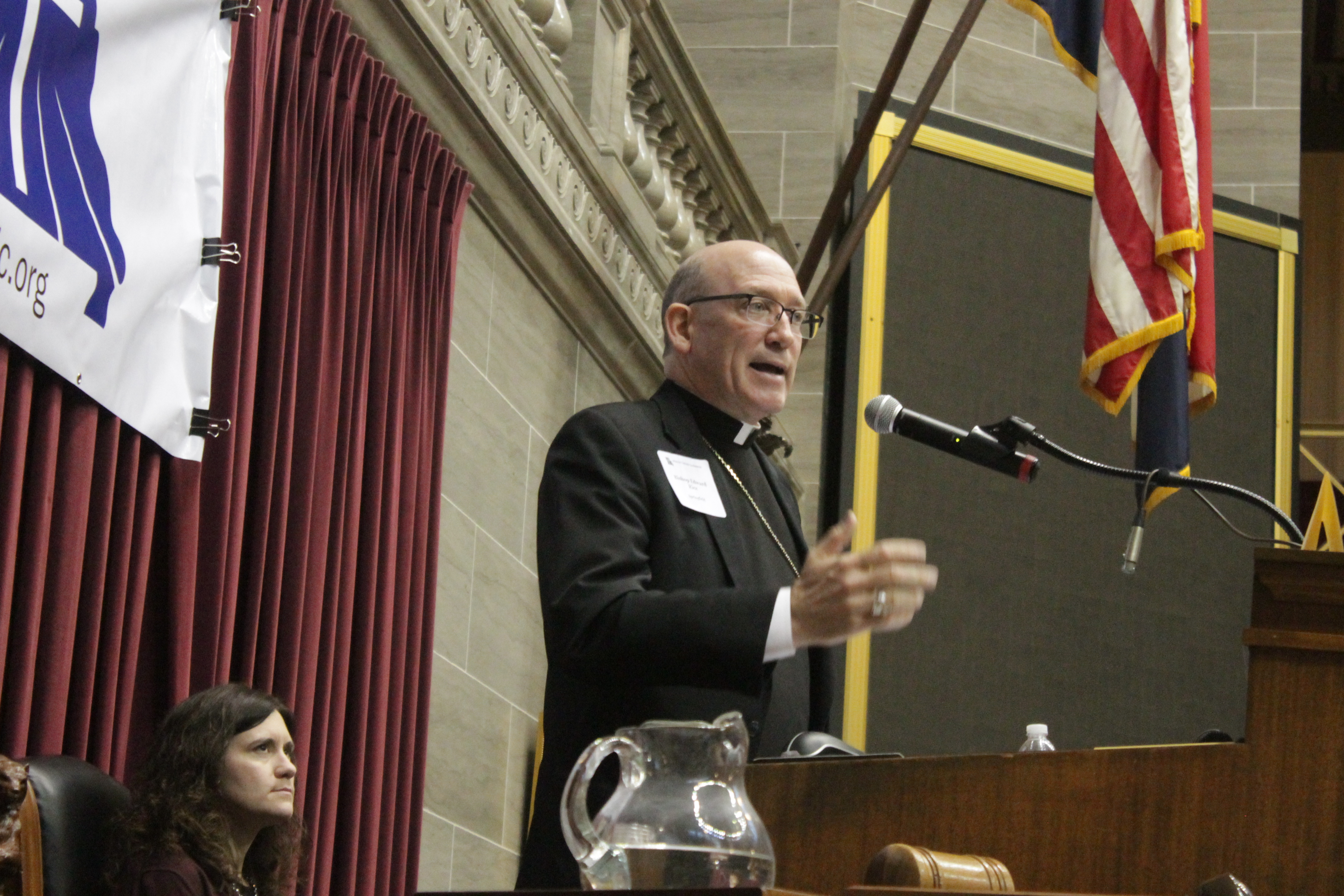
By Jay Nies
Catholic News Service
JEFFERSON CITY, Mo. (CNS) — The Jubilee Year of Mercy will conclude Nov. 20, but the Catholic Church’s renewed emphasis on mercy must not.
“If it does come to an end, shame on us!” Bishop Edward M. Rice of Springfield-Cape Girardeau proclaimed from the ornate dais of the House chamber in the Missouri Capitol.
Bishop Rice addressed 400 Catholics from all over the state at the Missouri Catholic Conference’s annual assembly.
The Oct. 8 assembly’s theme, borrowed from Pope Francis, was: “A little bit of mercy makes the world less cold and more just.”
The pope has described mercy as “being loved forever despite our sinfulness” and as “not getting what you deserve.”
Drawing from and extrapolating on the pope’s document instituting the Year of Mercy, “Misericordiae Vultus (The Face of Mercy)”, Bishop Rice spoke of mercy as a bridge to an encounter with Christ at the foot of His cross and into a relationship that transforms people and the entire world.
“What began at the Incarnation, what came to full expression on the cross, what is given to us in the Eucharist — that’s mercy. And as the children of God, we’re supposed to put it into practice,” said Bishop Rice.
Pope Francis based his call for the Year of Mercy on the fact that “Jesus Christ is the face of the Father’s mercy.”
“If we study the words of Jesus, if we look at the actions of Jesus, the entire person of Jesus, what we learn about is the mercy of the Father,” said Bishop Rice.
The pope is fond of reminding people that “mercy is God’s ID card” — that by which he identifies himself.
“It’s the very core of God’s existence,” said Bishop Rice. “Therefore, it must also be the core of our existence.”
Jesus on the cross, he said, is the culmination of mercy that becomes “the bridge of salvation and reconciliation between us and the Father.”
Mercy, whether initiated by God in Christ or initiated by any of his people, “is a divine activity,” Bishop Rice said. Seeking and accepting God’s mercy leads to humility and a desire for conversion.
“When you’re humble enough to open your heart to the mercy of God, he’s not going to leave you where you are,” he noted. “He’s going to call you to conversion and to change your ways.”
Returning from the 2013 World Youth Day in Rio de Janeiro, Pope Francis told reporters that “ours is a time of mercy — this generation.”
Bishop Rice reiterated the pope’s observation that the Church’s credibility is seen in how it shows merciful and compassionate love.
Mercy transforms everything it touches, the bishop said. “It has implications in our efforts for respect for life, for the entire spectrum, from the womb to the tomb.”
“Mercy has something to say about employment and education,” he continued. “Mercy has something to say about health care. Mercy has something to say about the poor and the marginalized … those who suffer violence, the refugees, those who are addicted, those who need housing, those who suffer from hunger.”
Forming a merciful response to these and other issues requires a desire and appreciation for mercy as the most powerful weapon in God’s arsenal.
“To the world, mercy, forgiveness and kindness are often seen as signs of weakness,” Bishop Rice observed. “But in the eyes of faith — mercy, forgiveness and kindness are signs of God’s power!”
Bishop Rice noted that the Year of Mercy and its themes of experiencing God’s mercy and becoming more merciful as individuals and as the Church have resonated profoundly with people of all ages.
All who receive that mercy are called not only to conversion and a deeper relationship with Jesus, he said, but also to a lifetime of putting mercy into practice every day. That means showing kindness and forgiveness to people who don’t deserve it, and it means being present to people and helping them in concrete ways.
This inevitably leads to a personal encounter with people who are poor and marginalized, who reveal the face of Christ, who reveals the face of God’s mercy.
Bishop Rice called to mind a sign a Protestant pastor in St. Louis posted shortly after Pope Francis announced the Jubilee Year of Mercy. It said: “Mercy is more than a year.”
“You know, the guy is right!” the bishop remarked. “In fact, it would be great if all of our Catholic parishes put up the same sign, because that’s our real challenge as the Year of Mercy draws to a close.”
Bishop Rice called on Catholics to take a close look at their parishes to see whether they have caught fire with mercy or grown cold with indifference.
“That’s one of the reasons the pope gave us the Year of Mercy,” he said. “He’s hoping for the fire of charity to spark once again and to burn into flame so that we can truly be the Church we need to be.”
For that to happen, Catholics must keep challenging themselves to grow in relationship with Jesus, spend time in silent prayer, read the Bible, adore Christ in the Blessed Sacrament, and encounter Him joyfully and frequently in the Eucharist, reconciliation and the other sacraments.
“The more we can have an encounter with the risen Lord,” said Bishop Rice, “the more He’s going to help us to experience mercy, to make it real, to make it tangible.”
Love remains an abstract theory until it is revealed through action, he said. “Only when it becomes visible and tangible can it be called mercy.”
He noted that the corporal and spiritual works of mercy are sacred acts, drawing people into a flesh-and-blood encounter with the living Jesus.
Bishop Rice called upon the intercession of Mary, the mother of Mercy, who “attests that the mercy of the Son of God knows no bounds and extends to everyone without exception.”
— Jay Nies is editor of THE CATHOLIC MISSOURIAN, newspaper of the Diocese of Jefferson City.






